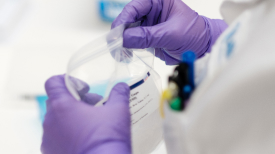- Cancer Care Team
Cancer Care Team
To deliver optimal patient outcomesProducts and Services
Cancer Type
Supplies & Tools
Scientific Focus
- Biopharma Partners
- Patients
- Education & Events
- Login
- Contact Us
Test Details
 Cancer Type
Cancer Type
Colorectal cancer (CRC), Endometrial, Gastric, Hereditary cancer, Lynch syndrome
 Technology Used
Technology Used
Molecular
 Turnaround Time
Turnaround Time
10 - 14 days
Use
Identify tumors with microsatellite instability. High-frequency microsatellite instability (MSI-H) is associated with Lynch syndrome, but it is also found in 15% to 20% of sporadic colorectal and endometrial cancers. Lynch syndrome is an autosomal-dominant inherited cancer syndrome that predisposes to colorectal, endometrial, gastric, ovarian, upper urinary tract, and other cancers. MSI-High status may enhance the likelihood of tumor responsiveness to immune checkpoint inhibitor therapy.
Special Instructions
This assay needs both (1) DNA prepared from FFPE (formalin-fixed and paraffin-embedded) tumor tissue and (2) matched normal tissue (FFPE or blood). Please provide a copy of the pathology report. This test will be delayed if the pathology report is not received. Please direct any questions regarding this test to customer service at 800-345-4363.
Limitations
MSI-H is a marker of underlying DNA mismatch repair defect but does not define specific gene mutations responsible for cancers. If direct testing for gene mutations responsible for Lynch syndrome is desired, please call customer service at 800-345-4363 for more information. This assay can detect 8% to 12% of mutant in a background of wild-type genomic DNA.
This test was developed and its performance characteristics determined by Labcorp. It has not been cleared or approved by the Food and Drug Administration.
Methodology
Multiplex polymerase chain reaction (PCR); capillary electrophoresis
Specimen Requirements
Information on collection, storage, and volume
Specimen
One paraffin-embedded tumor and either whole blood or paraffin-embedded normal tissue
Volume
Eight unstained slides at 5 μM and one matching H&E slide or FFPE tissue block or 3-5 mL whole blood
Minimum Volume
Samples with ≥4 mm² tumor and normal tissue surface area and ≥50% tumor content are preferred; 3 mL whole blood
Container
FFPE tissue block or slides, lavender-top (EDTA) tube or green-top (sodium heparin) tube, tan-top (K2-EDTA) tube or pink-top (K2-EDTA) tube
Storage Instructions
Blocks and slides at room temperature; whole blood at 2°C to 8°C
Causes for Rejection
Tumor block containing insufficient tumor tissue or no tumor; broken or stained slides. Whole blood: Contaminated specimen; frozen whole blood received; leaking tube; clotted blood; hemolysis; specimen containing suspicious foreign material; quantity not sufficient for analysis
Related Tests
Find more tests related to this one.





